Greetings! I'm Aneesh Sreedharan, CEO of 2Hats Logic Solutions. At 2Hats Logic Solutions, we are dedicated to providing technical expertise and resolving your concerns in the world of technology. Our blog page serves as a resource where we share insights and experiences, offering valuable perspectives on your queries.
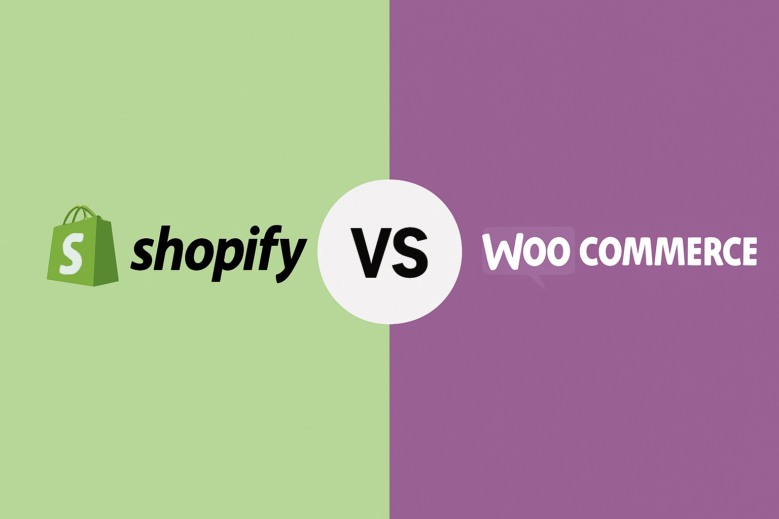
Quick Summary
Shopify beats WooCommerce for most businesses in 2025. It’s more secure, faster to set up, and offers better mobile experience. WooCommerce demands technical skills and constant maintenance. Shopify lets you focus on sales, not server management. For entrepreneurs wanting growth without technical headaches, Shopify is the clear winner.
Selecting the right e-commerce platform fundamentally determines your business trajectory and operational efficiency. With global e-commerce sales projected to reach $8.1 trillion by 2026, the platform decision carries significant strategic implications.
When examining Shopify vs WooCommerce, business owners face two distinct approaches to online commerce. One prioritizes simplicity and reliability, while the other offers flexibility at the cost of complexity.
The platform you choose today influences every aspect of your operations, from daily management tasks to long-term scalability. Understanding these differences enables informed decision-making that aligns with your business objectives and technical capabilities.
Understanding Your Platform Options: Shopify vs WooCommerce
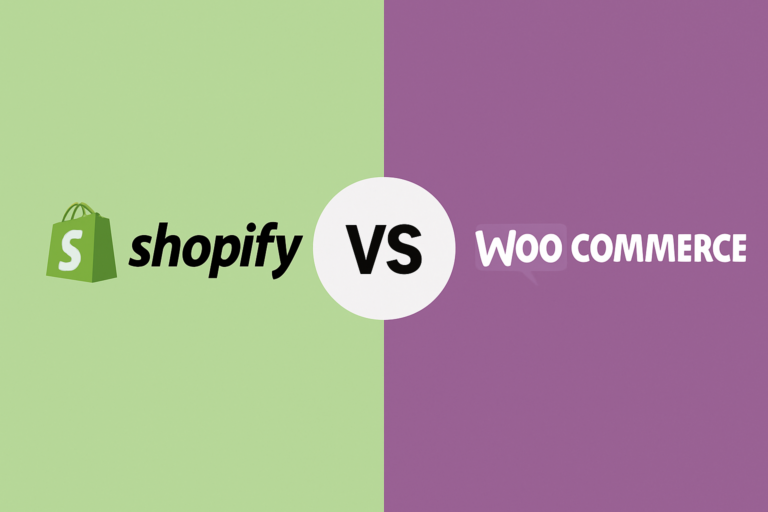
Every successful online business starts with the right foundation. Your e-commerce platform choice determines whether you’ll spend time growing sales or fixing technical problems.
Shopify vs WooCommerce represents two fundamentally different approaches to online selling. Understanding these differences helps you choose the platform that matches your business goals.
Shopify operates as a complete hosted solution. You get everything needed to sell online immediately. WooCommerce functions as a WordPress plugin requiring separate hosting, security, and maintenance.
This core difference affects every aspect of your business operations. From daily management tasks to long-term growth potential.
The Hosted vs Self-Hosted Decision
Your platform architecture shapes your daily business experience. This choice impacts everything from launch speed to ongoing maintenance requirements.
Shopify: Complete Solution Ready to Use
Shopify provides everything under one roof. Sign up today and start selling tonight. No technical setup required.
The platform handles hosting, security, and updates automatically. You focus entirely on products, marketing, and customer service.
This approach works perfectly for entrepreneurs who want to sell, not manage servers. Most successful online businesses choose this path.
WooCommerce: Approach with Full Control
WooCommerce gives you complete control over everything. You choose hosting providers, manage security, and handle all technical aspects.
This flexibility appeals to businesses with specific technical requirements. However, it demands significant technical expertise and ongoing time investment.
Consider this path only if you have dedicated technical resources or enjoy managing complex systems.
Ready to launch your store without technical complexity?
Security
Online security threats increase daily. Your platform choice determines whether security becomes your problem or someone else’s responsibility.
Shopify: Enterprise-Level Security Included
Shopify treats security as a core service, not an add-on. Their team manages SSL certificates, PCI compliance, and security updates automatically.
DDoS protection works at the infrastructure level. Regular security audits happen without your involvement. Your store stays protected while you focus on business growth.
Security patches deploy automatically across all stores. This consistent protection helps millions of merchants sell safely online.
WooCommerce: Security Becomes Your Responsibility
WooCommerce security depends entirely on your technical skills and diligence. WordPress core updates, plugin patches, and server security become your responsibility.
Missing a single security update can expose customer data and destroy your business reputation. The technical knowledge required goes beyond most business owners’ expertise.
Many WooCommerce stores get hacked due to poor security management. The cost of security breaches far exceeds platform fees.
Performance: Speed That Converts Visitors to Customers
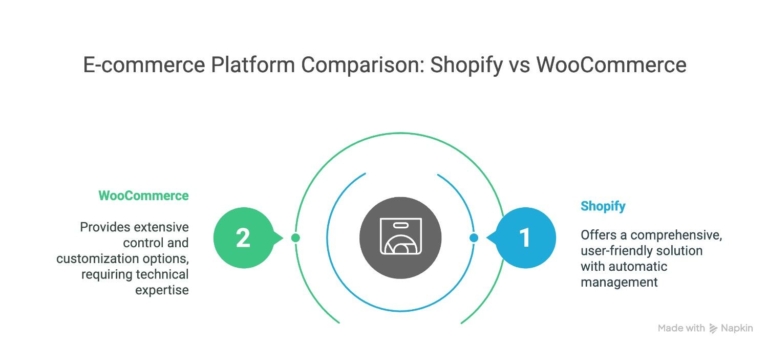
Website speed directly impacts your bottom line. Every second of delay reduces conversions by 7%. Your platform choice affects loading speeds significantly.
Shopify: Optimized for Speed by Default
Shopify’s global infrastructure ensures fast loading worldwide. Content delivery networks, image optimization, and server-level caching work automatically.
Mobile performance gets prioritized since mobile commerce dominates online sales. Your store loads quickly regardless of visitor location or device.
No technical optimization knowledge required. Fast performance comes standard with every Shopify plan.
WooCommerce: Speed Depends on Your Setup
WooCommerce performance varies dramatically based on hosting quality, theme optimization, and plugin efficiency. Most business owners struggle to achieve consistently fast speeds.
Poor hosting choices create slow, unreliable stores. Plugin conflicts and poorly coded themes further degrade performance.
Achieving fast WooCommerce speeds requires ongoing technical optimization. This expertise costs significant time or money.
Get guaranteed fast-loading speeds with our optimization services.
Cost Analysis: Transparent vs Hidden Pricing
Understanding true platform costs prevents budget surprises and helps with accurate financial planning.
| Cost Factor | Shopify | WooCommerce |
| Monthly Platform Fee | $39-399/month | $0 |
| Hosting | Included | $10-200/month |
| SSL Certificate | Included | $50-200/year |
| Security | Included | $100-300/year |
| Backups | Included | $50-150/year |
| Support | Included | $0-500/month |
| Updates | Automatic | Time/developer cost |
| Performance Optimization | Included | $100-500/year |
Shopify: Predictable Monthly Investment
Shopify pricing includes everything needed for professional online selling. No surprise bills or hidden costs appear.
Monthly fees cover hosting, security, support, and automatic updates. Budgeting becomes simple and predictable.
Higher-tier plans include advanced features like abandoned cart recovery and professional reports. Value increases with business growth.
WooCommerce: Hidden Costs Add Up Quickly
WooCommerce appears free but requires significant additional investments. Hosting, security, backups, and support create ongoing expenses.
Developer costs for customization and problem-solving often exceed Shopify’s monthly fees. Technical maintenance requires ongoing investment.
“Free” platforms often become the most expensive choice when true costs are calculated.
Shopify Pros and Cons: Complete Analysis
Understanding both advantages and limitations helps make informed platform decisions.
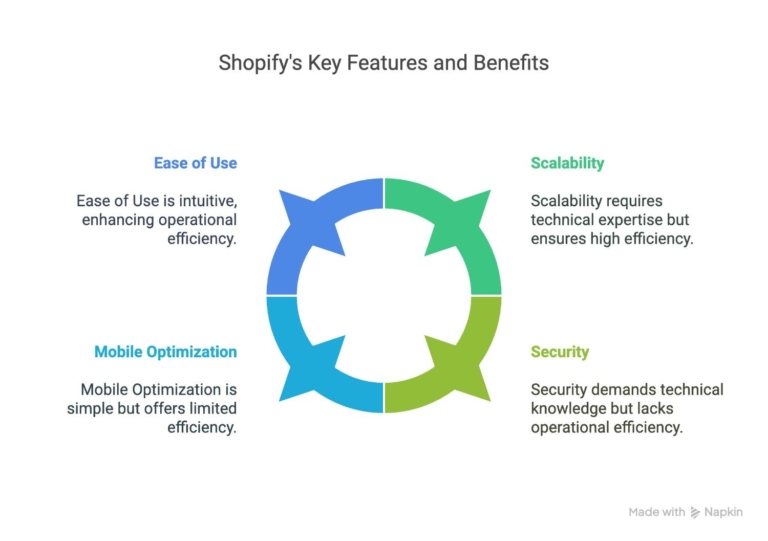
Shopify Advantages
Ease of Use: Intuitive interface requires no technical training. New users become productive immediately.
Reliability: 99.9% uptime guarantee with automatic failover systems. Your store stays online while competitors experience downtime.
Security: Enterprise-level protection included in all plans. PCI compliance and SSL certificates work automatically.
Speed: Global CDN and optimized infrastructure ensure fast loading worldwide.
Support: 24/7 phone, chat, and email support from e-commerce experts. Problems get resolved quickly.
Scalability: Platform handles traffic spikes automatically. No server management required during busy periods.
Mobile Optimization: Themes work perfectly on all devices. Mobile commerce capabilities included.
Shopify Limitations
Monthly Fees: Ongoing subscription costs even during slow sales periods. Budget planning must include platform expenses.
Transaction Fees: Lower-tier plans include per-transaction charges. Higher-volume stores benefit from advanced plans.
Customization Boundaries: Platform rules limit certain modifications. Complex customizations may require app solutions.
App Dependencies: Advanced features often require third-party apps. Additional costs and complexity result.
Vendor Lock-in: Migrating away from Shopify requires significant effort. Platform switching becomes complicated.
Concerned about Shopify limitations for your specific needs? Our consultation service evaluates platform fit before you invest.
WooCommerce Alternatives: Why Businesses Switch
Many entrepreneurs start with WooCommerce attracted by the “free” label. Business growth often forces platform reconsideration.
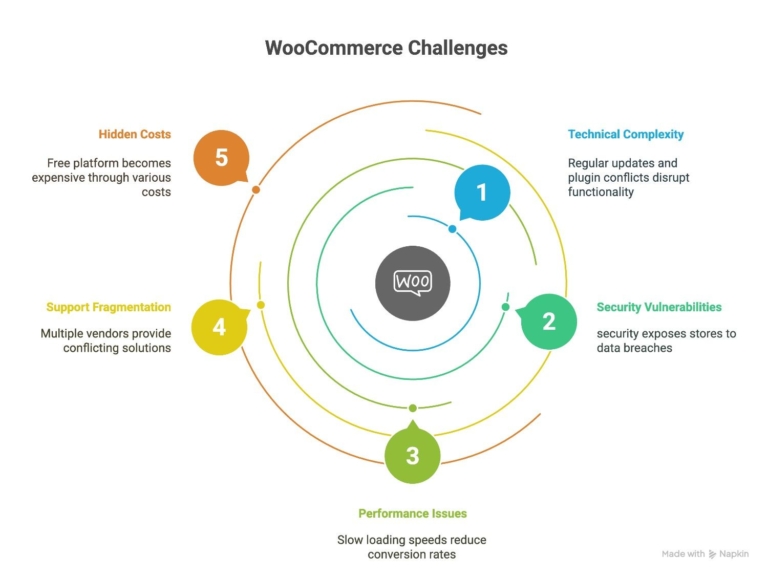
Common WooCommerce Problems
Technical Complexity: Regular updates break functionality. Plugin conflicts cause store downtime during critical sales periods.
Security Vulnerabilities: DIY security management exposes stores to data breaches. Recovery costs exceed prevention investments.
Performance Issues: Slow loading speeds reduce conversion rates. Technical optimization requires ongoing expertise and investment.
Support Fragmentation: Multiple vendors provide conflicting solutions. Problem resolution takes excessive time and effort.
Hidden Costs: “Free” platform becomes expensive through hosting, security, and developer costs.
Migration Trends
Successful WooCommerce stores frequently migrate to hosted platforms. Technical management time gets redirected toward business growth activities.
Growing businesses need reliable infrastructure without technical overhead. Professional hosting, integrated payments, and expert support become essential.
Shopify attracts businesses seeking growth-focused platforms. Time previously spent on technical management gets invested in marketing and product development.
Customer Support: Help When You Need It
Technical problems happen to every online business. Quality support determines how quickly problems get resolved.
Shopify: Comprehensive Support System
24/7 support includes phone, chat, and email options. Response times meet urgent business needs consistently.
Help documentation covers every platform feature comprehensively. Video tutorials explain complex topics clearly.
Community forums provide additional resources and peer support. Partner directory connects businesses with certified experts.
One support system handles all platform-related issues efficiently.
WooCommerce: Fragmented Support Experience
WordPress forums provide community-based help with inconsistent quality. Plugin developers offer varying support levels.
Hosting providers handle server issues but not WooCommerce-specific problems. Multiple support channels create confusion during urgent situations.
No centralized support system exists for comprehensive problem resolution. Simple issues often require contacting multiple vendors.
Frustrated with technical support?
Integration Capabilities: Connecting Your Business Tools
Modern businesses require seamless connections between multiple systems and services.
Shopify: Extensive Integration Ecosystem
Over 6,000 apps integrate smoothly with Shopify stores. Built-in connections work immediately without technical configuration.
APIs enable custom integrations for unique business requirements. Shopify Plus provides enterprise-level integration capabilities.
Popular business tools connect without compatibility issues. Accounting, inventory, and marketing systems work together seamlessly.
WooCommerce: Complex Integration Management
Plugin compatibility requires constant monitoring and testing. Updates often break existing integrations.
Custom development frequently becomes necessary for specific integrations. Technical expertise requirements increase integration costs.
Multiple plugins can conflict with each other, creating stability issues. Performance impacts need evaluation with each new integration.
SEO and Marketing: Built for Growth
Effective search optimization and marketing tools drive sustainable business growth.
Shopify: Marketing-Ready Platform
SEO features work automatically without technical configuration. Clean URL structures and optimized code help search rankings.
Fast loading speeds and mobile optimization directly improve search performance. Marketing automation tools integrate seamlessly.
Built-in analytics provide actionable insights for business growth. Email marketing and social media tools work together effectively.
WooCommerce: Marketing Requires Additional Setup
SEO plugins need installation, configuration, and ongoing maintenance. Performance optimization affects search rankings significantly.
Marketing tools require individual setup and integration. Analytics implementation needs technical knowledge.
Each marketing system requires separate maintenance and updates. Complexity increases with business growth.
Making the Right Choice: Shopify vs WooCommerce
Platform selection impacts every aspect of your online business operations and growth potential.
Choose Shopify When You Want
- Quick launch without technical complexity
- Reliable performance and automatic security
- Professional support and guidance
- Mobile-optimized customer experience
- Predictable monthly costs
- Time to focus on business growth
Consider WooCommerce Alternatives When You Have
- Extensive customization requirements
- Dedicated technical development resources
- Need for complete platform control
- Complex integration requirements
- Time for ongoing maintenance
- Technical expertise for security management
Make the right choice with our platform consultation service
Shopify vs WooCommerce: The Final Verdict
Shopify vs WooCommerce represents a choice between simplicity and complexity, reliability and uncertainty, growth focus and technical management.
Successful entrepreneurs understand that time spent on technical platform management is time not spent growing their business. Shopify eliminates technical distractions and provides everything needed for online success.
WooCommerce appeals to businesses wanting complete control but demands significant technical investment. Hidden costs, security risks, and complexity often overwhelm business owners seeking growth.
The smartest choice depends on your priorities. Growing businesses choose platforms that support growth rather than creating technical obstacles.
Conclusion
The e-commerce platform you choose today shapes your business trajectory for years to come. This decision affects daily operations, growth potential, and long-term success.
Shopify has become the preferred choice for growth-focused entrepreneurs because it removes technical barriers to success. WooCommerce works for businesses with dedicated technical resources and specific customization needs.
Launch your store with experts from our Shopify development services for complete setup, customization, and optimization. Get your professional store live in days, not months. Contact us today for your free consultation and discover how the right platform choice transforms your business potential.
Table of contents
- Understanding Your Platform Options: Shopify vs WooCommerce
- The Hosted vs Self-Hosted Decision
- Security
- Performance: Speed That Converts Visitors to Customers
- Cost Analysis: Transparent vs Hidden Pricing
- Customer Support: Help When You Need It
- Making the Right Choice: Shopify vs WooCommerce
- Shopify vs WooCommerce: The Final Verdict
- Conclusion

Related Articles







